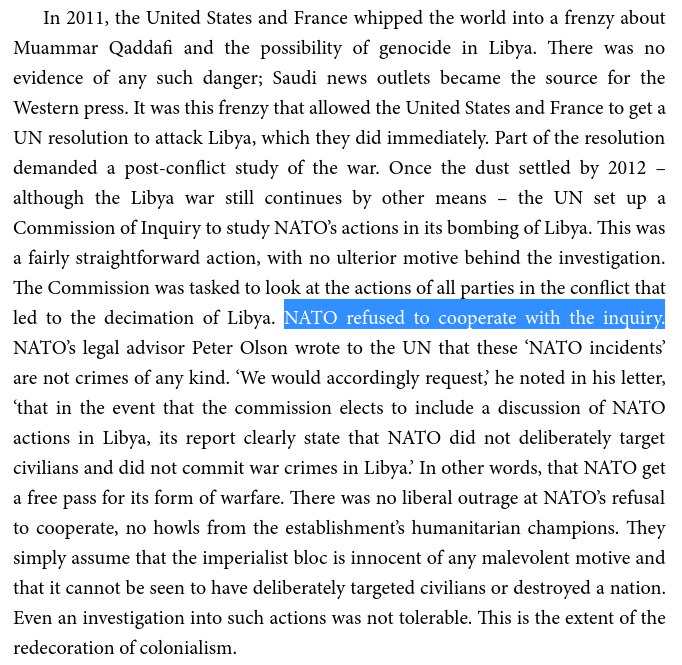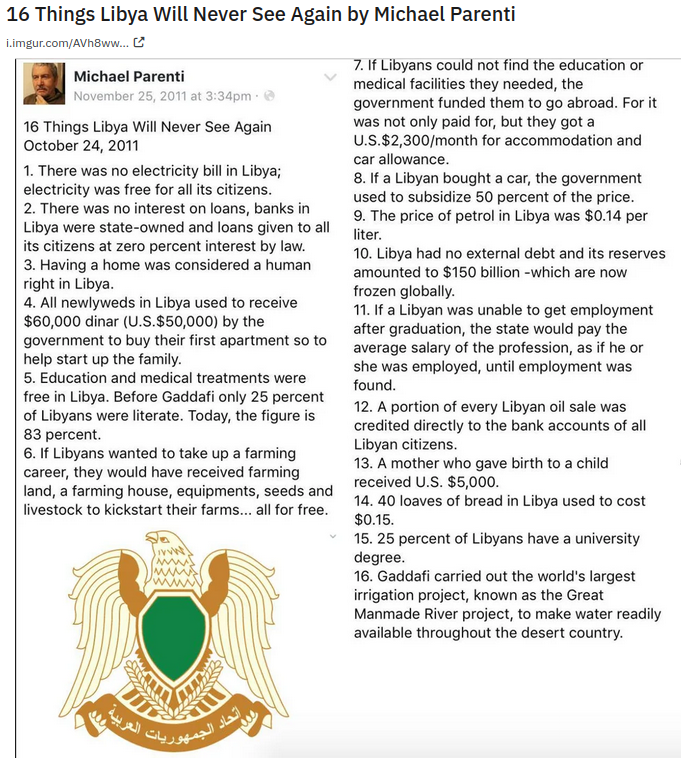https://sh.itjust.works/post/4274675
To this I say, no. As a community, we do not deny proven genocides, like the holocaust, or the genocide against indigenous Americans by various European colonizers, or the genocide against the Congolese by Belgium, or the Bengal famine that was carried out by the British empire. In fact, denying those genocides will get you banned, here. However: we are also aware of a tendency of nations to project their crimes onto others, and to manufacture atrocity propaganda to justify overthrowing or destroying rival governments... like Libya in 2011:
From Washington Bullets by Vijay Prashad (a great book I highly recommend)

A post from Michael Parenti regarding the destruction of Libya by NATO-backed reactionaries

A headline shortly after Libya's destruction by NATO-backed reactionaries

The US government has been reenacting the fable of the Boy Who Cried Wolf, and has been cynically leveraging the very serious accusation of genocide against its geopolitical enemies. This is the source of skepticism on Xinjiang. And this is not a new strategy, yes, the Holodomor, which everyone in the US has been taught to take seriously lately, is a nazi fabrication first spread to the United States in the works of Robert Conquest. Why would the USSR deliberately starve a fellow socialist Republic? Why would Stalin, a Georgian, have some kind of Russian chauvinist grudge against Ukrainians? Why would Lenin (Donbass), Stalin (Lviv), and Khruschev (Crimea) all expand the territory of the Ukrainian SSR while also trying to kill off the people inside of it? Why would the USSR ethnically cleanse Ukrainains while simultaneously sending food aid to the starving British colony in Bengal? Natural famines and crop failures were spun by the nazis into atrocity propaganda. Also, a state does not have to be perfect to be defended against false accuations. I think China is far from perfect, but the burden of proof is on the United States to prove its accusations (which have changed in scope several times) regarding Xinjiang. Delegations from Muslim majority nations visiting Xinjiang do not agree with the United States that there is a genocide of the Uyghur people. There is however an attempt to reeducate extremist groups like ETIM. Reeducating extremists might seem a harsh government policy, but I assure you it is a better way of dealing with religious fundamentalism than drone striking weddings or air striking hospitals like the USA did in Afghanistan.


Absolutely, but the people hurling accusations don't care about the strength of arguments. They're not even necessarily trying to make an argument (in the logical sense). Tossing back a document that says "genocide is hard to prove" isn't going to win them over. It's more likely to make them double down. And that strikes me as a mistake.
There's also the problem that to people who rightfully abhor it, any action that appears to be rules-lawyering genocide is almost certain to be rejected, turning away any audience that might have been receptive to a counter-narrative.
That just leaves commenters who already agree, and when they join in, Hexbear is 'brigading with denialist propaganda', which feeds into the chuds' sense of righteousness when they harrass us.
Something this contentious needs time and a degree of receptivity, neither of which is provided by 'throwing out' some bombshell of evidence.
deleted by creator
What fraction of lurkers do you think are won over by 'Nuh-uh, it's not technically genocide'? Not many, I'd bet.
I'm well aware of the performative aspects of online discussion. It is exactly that performance that I'm criticizing. As I said before, rules-lawyering genocide is not a good look. And giving the opponent an easy out allows them to steal the show.
420blazeit69 has provided a better lead-in:—
which might then be followed by the reminder that a motivated US State department wasn't able to do that—not even with all the efforts of a Nazi apologist. With additional detail, that would be somewhat more persuasive than simply "[throwing it out and seeing how they respond]". It at least returns the burden of justification, although I still think there are better spectator sports to play.